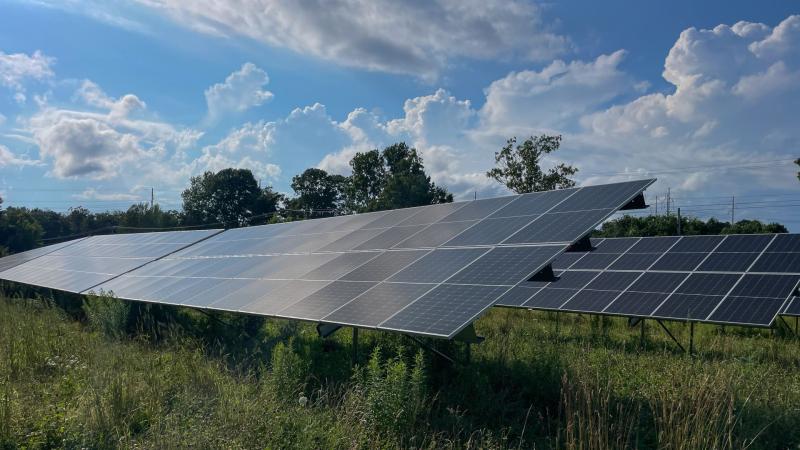Maine’s community solar program, commonly known as net energy billing, has been wildly successful in incentivizing the development of small-scale solar power projects. They’ve popped up like mushrooms as developers chase the deals codified by state lawmakers, allowing them to sell power at a premium above market rates.
Some critics point out that the situation has also allowed large corporations and private equity firms to pocket Maine ratepayers’ cash. But a Maine Monitor analysis found it’s hard to track this pattern because the ownership is often opaque, and no state entity keeps tabs on it.
Community solar — which includes projects producing less than 5 megawatts of energy — is a bit complicated. Subscribers don’t receive power directly from the projects, but instead get credits for the power that is generated. The credits offset their electricity use, and should lower their electricity bills, while supporting renewable energy.
According to a new solar dashboard developed by the Governor’s Energy Office, the state has 453 projects totaling 630 megawatts of operational solar energy in its net energy billing programs developed since the enabling legislation passed in 2019. (The figure excludes residential rooftop solar.)
Although the Governor’s Energy Office tallies the power generated by the projects, it does not track ownership. The Public Utilities Commission posts reports filed by Central Maine Power and Versant that show the projects participating in net energy billing, but the owners are redacted.
Corporate deals
While it’s hard to get details, corporate press releases offer glimpses into the deals.
In March 2021, Nautilus Solar, owned by Power Corporation of Canada, announced it was buying solar projects in Cumberland, Knox, Oxford and York counties. Nautilus bought two projects in Aroostook County later that year.
In December 2021, Goldman Sachs Asset Management announced it was buying 11 solar projects in the net energy billing program from a Pennsylvania developer, Dynamic Energy. (Goldman Sachs has since spun off its solar holdings into a new corporation called MN8 Energy.)
In January 2022, Distributed Solar Generation, owned by BlackRock, said it was buying net energy billing projects in Rumford and Windham from Mainely Solar.
These corporate deals appear to include projects that are permitted but not yet constructed, so it’s hard to know what percentage they represent of the operational energy in Maine. Two more large corporations account for a significant amount of the energy produced in the net energy billing program.
In December 2022, the Brookfield company Luminace bought net energy billing solar projects in Bristol, Emden and Woolwich, with 21.6 megawatts of capacity, from EDF Renewable. Between Luminance and Standard Solar, Brookfield companies have a capacity of about 113 megawatts of Maine solar.
Nexamp, owned by Mitsubishi, has about two dozen projects totaling 165 megawatts of capacity in the net energy billing program, with more in the pipeline. (Disclosure: This reporter is a Nexamp subscriber).
Unlike the projects developers have bundled and sold, spokesperson Keith Hevenor said Nexamp has an integrated business model. “We own and operate all of our projects for the long term,” he said, “handling everything from development and engineering to construction, operation and customer management in-house.”
Concerns over ownership
Lawmakers and other observers have questioned where the money being poured into community solar programs is ending up.
Rep. Sophie Warren (D-Scarborough) ran for the legislature to take action on climate change. She supports solar energy but takes issue with the structure of the program.
“I really do believe … that a majority of Mainers don’t want to see us paying for projects out of our utility bills to corporations and private equity interests,” Warren said. “I think that’s wholly inappropriate. We’ve got to move beyond just fighting climate change to doing it in a way that is just.”
Warren said she would rather see larger, grid-scale solar projects that can produce power at lower rates. And she feels the current program is regressive because ratepayers bear the cost.
In 2023, Warren pushed for reforms to the program, and ended up supporting legislation that continued the program with further limits on the size of projects. The bill tweaked the formula for subsidies and limited the type of projects that can participate.
Bill Harwood, the Maine Public Advocate, has criticized the net energy billing program for its cost. He estimates the projects will cost Maine ratepayers roughly $220 million annually for 20 years; roughly $275 per ratepayer per year.
“Although we generally welcome investments in Maine infrastructure, the large amount of investment in NEB projects is an indication that the subsidy is larger than needed to achieve the desired level of solar energy,” he said in an email. “And whenever the state provides significant subsidies to private firms, we believe the public has a right to know who is receiving those subsidies.”
The subsidies can vary, but Harwood said on average, projects in the net energy billing program receive more than 20 cents per kilowatt hour, each costing less than 10 cents to produce.
Tony Buxton, who represents large electricity users in Preti Flaherty’s Industrial Energy Consumer Group, said his primary concern is those financial incentives in net energy billing are excessive, and are raising energy costs for his clients. But he also feels proponents misrepresented the ownership angle.
“It was represented in 2019 at the legislative hearings that this would help local developers of solar,” Buxton said. “That was false. It may have helped a few of them, but the vast majority of these benefits have gone to out-of-state corporate entities.”
Local investments
Supporters, meanwhile, tout the program’s overall benefits. Rebecca Schultz of the Natural Resources Council of Maine pointed to an April study prepared for the PUC, which showed the benefits of the NEB program outweigh costs when greenhouse gas and environmental benefits are factored in.
One local company that has developed a significant proportion of the solar projects is Revision Energy. Its president, Fortunat Mueller, said it has built projects totaling about 50 megawatts of capacity; roughly 25 more are under construction.
Most Revision projects are direct-ownership community solar, meaning customers do more than subscribe to the project, they actually own the panels. (The accounting is roughly the same as a subscription service — owners get credits for the power generated.)
“One of the amazing things about solar, and (distributed generation) more broadly, is the opportunity to democratize the energy system,” Mueller said. “I think if you centralize ownership in just a handful of large financial entities, you are leaving that benefit on the table, and you are not fully recognizing the opportunity that comes with switching to a distributed generation system.”
But Mueller cautions against setting a double standard for renewable energy.
“We don’t know who owns the power plants that we’re currently buying power from,” he said. “Let’s make sure that we apply the same standards to the oil infrastructure and the natural gas infrastructure and the grid infrastructure.”
Karl Rabago, a renewable energy consultant, said it’s not surprising to see the high level of corporate investment in the solar program. After all, that’s the point of the Inflation Reduction Act, which has supported some net energy billing projects in Maine.
For now, the ownership of many of the net energy billing solar projects in Maine is a mystery, and the pattern of ownership remains a sore point for some.
“I have all due respect for Goldman Sachs but I don’t think that we should be directing ratepayer money into their pockets,” said Warren, the state representative. “I think most Mainers, certainly the people I represent, wouldn’t think that’s sound policy.”





























